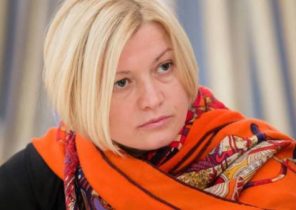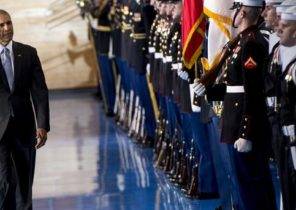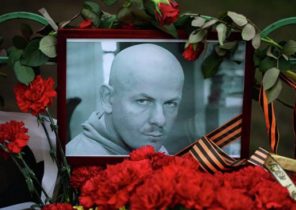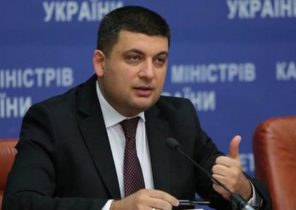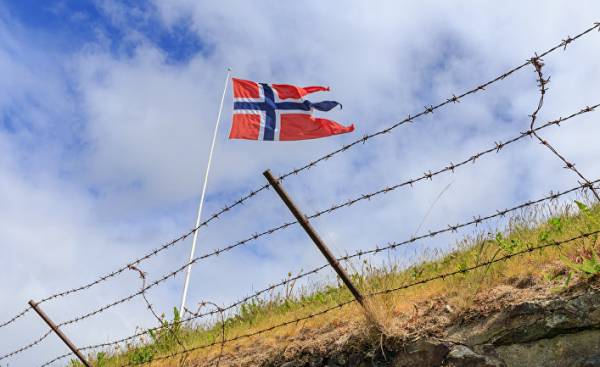
The activist of the peace movement Langemyr Hedda (Hedda Bryn Langemyr) believes that Norway against Russia behaves aggressively, it gets many political parties — from the Socialist left to the Party of progress. But some of her views often surprise those who accuse her of naivety in relation to security policy.
Hedda Langemyr (36 years) head of the Norwegian peace Council. Lately, she often takes part in passing in society debates. Norway’s policy towards Russia, participation in military operations abroad, long-term plans of the Norwegian armed forces, the deployment of us soldiers in Norway — all this from Hedda got on the first number. Don’t pass it, attention and a substantial part of the political establishment and the journalistic bar.
First of all, she believes that the policy that we do today, contributes to the escalation of conflict and increased tension in relations with Russia. According to Langemyr, the debate about climate change and the corresponding rhetoric in our country to be unduly provocative.
Aggressive Norwegian policy and rhetoric
— What, in your opinion, is it not in the Norwegian policy towards Russia?
— We are too aggressive. Since 1949, we had to balance our membership in NATO and our relations with Russia. So we had some limitations, which we ourselves have undertaken, in particular, we did not participate in major NATO exercises in the North, we gave up the nuclear weapons on Norwegian soil and the deployment of foreign troops in Norway in peacetime. From this, we now moved at the same time, we are now engaged in aggressive rhetoric that increases tension. We largely have to rely on NATO and the sanctions policy of the EU, conducted at the expense of independent choice in foreign policy, which could dampen conflicts and reduce tensions. From the point of view of the security policy of Norway, as a small state such an aggressive attitude towards Russia is not good. We face many tasks related to the Northern areas, and in addressing them in the future, we are dependent on Russia, says on Langemyr.
— The extent to which several hundred American soldiers in the middle of Norway constitutes “aggression”?
— If you look at it in isolation, it is not the kind of aggression that should cause a massive reaction from the Russian side. But if you take into account the context in General, the placement of American soldiers is part of the rate changes in Norwegian policy towards Russia, which means more deterrence and causes more wary. Before Norway did not put American soldiers on its territory in such quantities. By themselves, the soldiers are not some kind of incredible challenge, but when you consider everything else, it becomes a symbolic action which unnecessarily degrades the Norwegian-Russian relations.
— You once said that Norwegian politicians and the media (this applies to us on the portal aldrimer.no) “playing on fear” and use “aggressive rhetoric” in regard to security policy. What do you mean?
— Politicians and the media are using bad rhetoric with regard to Russia, due to replicated their exaggerations created the image of Russia as a military threat to Norway. As for how to describe the relationship of Norway to the Russian journalists, here, however, distinguish between Northern Norway and the rest of Norway. Because those who are connected with Russia and talks with Russian daily, treat them much more calmly than we who live in the South of the country. The lack of military cooperation, lack of political dialogue and the policy of sanctions to create distance and one-sided representation of Russia as a security threat and it causes fear. Good bilateral relations with Russia can be built only if we engage in dialogue and to cooperate in addressing common challenges, says Langemyr.
“The government artificially creates enemy images”
— You also talk about the “artificial creation of enemy images and the rhetoric of intimidation.” What do you mean? Can you give some examples?
We live in dangerous times, a lot of what causes our concern should be taken seriously. But we should also not forget the fact that politicians at all times use images of the enemy in order to carry out their policies, whether it is building weapons, the creation of political alliances or nationalism. I believe that the government actively resorted to anti-Russian rhetoric to justify and reinforce the importance of NATO in border areas. Such comments Eriksen Sereide (Minister of defence of Norway — approx.ed.) as “our relationship to Russia will never be the same”, “Russia poses the biggest threat to our security”, and that, Solberg (Prime Minister of Norway — approx.ed.) a couple of weeks ago, just shrugged off the warnings being made by the Russians, as from the purest propaganda, confirms this.
— It is possible to argue that Russia significantly increased its military power. They waged war and annexed the territory in the vicinity of yourself. Senior Russian officials over the past year, twice threatened Norway with nuclear attack. The country is also engaged in large-scale espionage activities and propaganda. Is it really an artificially created image of an enemy?
— No, but if you focus solely on the actions of Russia do not take into account the dynamics in relations between the superpowers. There’s extremely one-sided picture of Russian aggression, and the image of the role of the West is very dim. It’s a bad starting point for a debate about détente and disarmament. In any conflict we are faced with when both sides are using facts selectively to create and strengthen images of the enemy. We are often sandwiched between these two sides in the debate, says an activist of the peace movement, and adds:
We are accused that “allow the Kremlin to behave as he pleases”, as we call for renewed dialogue with Russia, but sometimes in the same week we are accused and that we are “at the Beck and call of NATO,” if we affirm that NATO can also sometimes contribute to the stabilization and to play a positive role. The task of the peace movement — building bridges between the various parties, encourage them to open and comprehensive debate and to propose own solutions to specific problems. That all often ends up that you have to disappoint the far-reaching claims about who is right and who is wrong, or about who the good guy and who is bad in the international arena, can be transferred. Because if you want peace, it is not enough just to be right.
She fears the dynamics leading to the intensification of the military hysteria
The construction of bridges, trade-offs, de-escalation of conflicts — all this is close to the hearts of Hedda Langemyr. During the interview we talked about different situations in history, she, in particular, believes that lessons should be learned from the prelude to the 1st world war.
Many historians, of course, will say today that the superpowers did not understand the consequences of the great war. They also did not understand or are unable to stop the war hysteria that began after the assassination of the heir to the throne of Austria-Hungary. That could be just an episode or regional war, became a world war.
A network of alliances and suspicion toward the other side made it difficult to de-escalation. It failed, despite several attempts to approach the world, especially between Germany, Britain and Russia at the last moment before war broke out. The Russian Council of state, which in the end made the decision on mobilization was perfectly aware that he does not want war. However, they wanted to support Serbia, which. Austria-Hungary invaded after the assassination. The country has mobilized, but Germany took it as a threat and also declared mobilization. Germany was preparing to attack Russia’s ally, France, but she had to go through Belgium. It is involved in the war Britain. At the last moment the British Minister of foreign Affairs and the German Chancellor agreed to end the war. But Kaiser Wilhelm II received from his generals a message saying that it is too late.
On the one hand, to be the latest country pursuing the mobilization was difficult because it meant a clear disadvantage militarily. It was hard to be the first country, which reduces the level of conflict. Demobilization did it is clearly weaker militarily. All attempts to stop the process running in the summer and autumn of 1914, failed. When the war started, the Apocalypse has become a fact. 18 million died. Besides, we should not forget about all the indirect consequences, such as world war II, communism and the creation of the Soviet Union, etc.
Hedda Langemyr not in a hurry to draw Parallels between the current situation and historical events. But she fears that too large a part starts to play a suspicious attitude toward the opposite side, the tension and the arms race. This situation needs to stop before it gets out of control, she believes. Perhaps the most important thing is to create the space for maneuver, to choose the reduction of tensions, dialogue and compromise.
— We fear what we don’t know. When experts in the field of security policy today is to throw us the worst scenarios, they do not necessarily resort to scenarios of the cold war. They often represent the escalation of the situation before world war I, when the escalation of the arms, uncertain alliances and the movement of borders has contributed to the escalation, which resulted in a global catastrophe — says Hedda Langemyr and adds that it is essential for the understanding of the situation.
Misunderstandings formerly led to wars. The inability to imagine horrible scenarios, the inability to think about how the opponent interprets your own motives, led to wars. Understand not to accept this premise in order to put yourself in the situation of others, to better understand how they will react. What we’re trying to imagine how Russia perceives our actions — to call for understanding — is not meant to be at the Beck and call of someone, that only means the quest for peace. To understand does not mean to agree or accept, it is an effective security policy.
Activist she was before
Hedda langemyr the beginning of the fight for peace started acting at an early age. She is originally from Setesdalen (Setesdalen), but in childhood and adolescence lived in many places: Volda (Volda), Eustace (Øystese), Lillehammer, and Minneapolis. She says that the family was the eldest of five children, “curious, inquisitive, thoughtful and a bit of a bookworm”.
— I had the opportunity to see, experience and participate in what many of my peers and was very distant. But thanks to this childhood and adolescence I — a disturbing nature.
— And the fight for peace you become involved due to the peculiarities of his personality?
I think not, but I’ve always had a keen sense of justice, I protected others. I guess sometimes I was even too smug — most important for me was that I had to be right. But, if you do not listen to much sense to shout that you’re right, no. So in recent years I’ve become more of a worry, how can we create the space for a decent, knowledge-based and ideology-free discussion about Norwegian politics, defence, security and peace, says Langemyr, which says that the struggle for peace for her and feelings and more analytical view.
— I’m an emotional person, but tend to Analytics. I never thought that I could be an idealist, but I always have strong feelings towards what you do. Are two different things.
When she was 19 years old, a sense of responsibility awakened seriously. The turning point was the conflict in Kosovo, which led to the fact that NATO began to bomb Serbia.
— Immediately after the war in Bosnia, my father began to work for the organization called the Nansen dialogue and was connected with the Nansen School in Lillehammer. The aim of the project was to promote dialogue and mutual understanding — regardless of political, national, religious and other dividing lines in the former Yugoslavia, she says.
— When in 1999 the war broke out in Kosovo, I was in School Nansen, and there was a group of students from Kosovo, which because of the war could not return home. On March 24, when the bombing began, we sat with the Kosovo Serbs and Albanians in Endhandler (shopping centre — approx.ed.) and drinking beer maybe drank more than I should have. They had completely different positions and thoughts about the NATO intervention, but the General was the fear, they were terrified for their loved ones, and they were not confident in the future. I spent with them the next 78 days, received confirmation that in the war all sides suffer great losses that we must do everything we can to avoid the situation developed in this direction”, — says Langemyr.
She wants sanctions against Russia remained
She says we should learn from history, including, for example, many wars with catastrophic consequences. It’s funny that this argument often cite its ideological opponents. And when we ask her about the sanctions against Russia, we received the answer, which would have signed and many of those with whom she usually argues.
— And whether to lift the sanctions against Russia?
— No, but we need to discuss the mechanism of action and how the goal is achieved. From the point of view of history, Western sanctions against Russia are harsh. However, it seems that the policy of sanctions does not work because: 1. Russia has not changed its policy towards Ukraine. 2. Sanctions have strengthened Russia’s nationalist Patriotic forces, not progressive and Western-oriented. 3. The sanctions contributed to the fact that Russia was even more isolated from the West and is now strengthening its relationships with authoritarian regimes, says on Langemyr. But adds that sanctions should be mitigated.
Norway should fight for the easing of sanctions, and if Norway will take a different line than the rest of the EU, it will be met with understanding, because we have few other interests.
— Do you agree with the justification of sanctions? Gradually, many have the notion that Russia in recent years is aggressive. The annexation of Crimea, the Russian armed forces in Ukraine, interference in elections in the West, the campaign of propaganda and misinformation, the attempted coup in Montenegro, etc. How do you like this picture? It was created artificially?
— No, Russia was more aggressive in recent years — I think everyone agrees. But interesting topic for discussion is why Russia has become more aggressive. Maybe it is due to the fact that the West was no less aggressive in their struggle to bring their interests to the territory of Russia?
— Certainly, many in it would argue that countries that are members of NATO themselves have preferred — as a result of democratic processes. And that’s a good argument to stop thinking in terms of spheres of influence. Should countries be able to join NATO without it being interpreted as aggression on the part of the Alliance?
— I have great understanding for the situation in which some Eastern European countries, and will not underestimate the vulnerability that they experience as the former Soviet state, now independent countries that want to move away from Russian dominance. The annexation of Crimea has made this fear more real, especially for the Baltic States.
— In the Baltic States, many fear that they will become the next target of Russia. They want the Western leaders clearly limited ambitions. What do you think about this?
— What real fear does not necessarily lead to any realistic scenario. Russia is seriously bogged down in Syria, and in the East of Ukraine. Despite the fact that they tried to modernize and strengthen its armed forces in recent years, this does not mean that Russian are ready to subjugate the rest of the world. But in order for NATO to strengthen its presence in areas close to Russia, we need a narrative that could justify an increased presence. Both Russian and Western military industry is heavily cashing in on the fear-based rhetoric and policy that we now see. Whether this will lead to greater peace and security in Europe — is another question, says Langemyr.
She criticizes Norwegian media
Hedda Langemyr repeatedly criticized on various occasions by the Norwegian media. Know too little about Russia, poor analyze, constantly in pursuit of sensationalism, they do not have enough nuances. All this greatly contributed to the rhetoric leading to the escalation of conflict, says head of the Norwegian peace Council.
— What the Norwegian press is doing wrong, when we are talking about Russia?
Media does not have enough knowledge. Lack of resources and fierce competition between media and other digital platforms means that the number of correspondents abroad, the journalists involved in the investigation, “digging deep” has greatly reduced. Media are not working like the fourth estate. In fact, Norway has only one Norwegian journalist, is an expert on Russia, is the present correspondent of the TV channel NRK. This is too little. All the big media should have permanent correspondents in Russia. And considering the fact that many things are classified, many of the processes in the field of security policy are closed, many media outlets simply reproduced on the pages of official Norwegian policy, instead of a strictly correct it.
— A project that aldrimer.no does not такl?
— In principle, investigative project aldrimer.no important. We need more journalists who have raised such issues as defence, security and peace in public debate. Investigative journalism could give more nuances, could contribute to reducing conflicts, but the pursuit of sensations and the language you sometimes prefer to use, contributes to the escalation of crises and alarmism, says Langemyr.
She wants to strengthen the Norwegian armed forces
If the head of the peace Council could take decisions, for it is quite clear that should strengthen the armed forces of Norway. And this view is also shared by many of those who criticize her. But the way she would have done it, in many respects different from the position of others. It would give the armed forces a clear defensive nature would take care of reliable territorial defense. Langemyr with much less enthusiasm applies to operations abroad and led by NATO bombing.
— If you could decide, what would the Norwegian security policy?
For me the priority would be five points. First, a more reliable defense. Secondly, closer cooperation in the defence field in the North of Europe. Thirdly, a return to the self-assumed restrictions and measures to reduce the likelihood of conflict with Russia. Fourth, I would have paid more attention to other threats: such as ecology, extremism and other non-military threats. And finally, I would have done to Norway has led the struggle for the prohibition of nuclear weapons in the world. If we get rid of nuclear weapons in the world, our security will increase significantly.
— Probably, here you are much closer to the many enthusiasts from the armed forces than to the government, at least, two points.
— I think that there is nothing to worry. Power organizations for peace in that they can cooperate with the professional military, where appropriate. The current government should listen to the military, and fighters for peace.
It rejects the naive “appeasement”
One of the most important objections that have many causes peace movement, lies in the perception of naivety. Hedda Langemyr, like many others, blame the fact that she advocated a course of “appeasement” towards Russia. When Neville Chamberlain in 1938 signed his historic agreement with Hitler and declared “peace for our time”, it was a fatal mistake. Nazi Germany ignored the agreement and continued to pursue its aggressive policies. Two years later world war II. Langemyr heard criticisms that today’s peace movement as naive as Chamberlain then. But she couldn’t disagree.
— And you see something in common between Georgia, Crimea, Eastern Ukraine, parts of the Baltic States today — and the Sudetenland, Austria, East Prussia, etc., in the 1930s.
Of course, I am extremely skeptical of attempts to compare different historical periods. In 1930, the society was quite different than in 2017 — in particular, nuclear weapons, has changed all ideas about security. We should learn from history but not be slaves. Solving current challenges in security policy, you should look to the future, not the past.
Last вопросt: What do you think about the Russian leadership? About his attitude to democracy, freedom of the press, actions in relation to neighboring countries?
Of course, I not Putin’s supporter, not a supporter of it being arbitrary and demonstration of power relations to the press, human rights defenders or civil society. If it came about in the conversation, then I don’t see any real alternative to Putin, more oriented to the West, more progressive or more democratic. On the contrary: everything is important and sets the tone of the political forces that can challenge Putin and become his successors, more nationalistic and authoritarian. Therefore, we need to rely on it to conclude with Russia the agreement — if we wait for the change of power in the Kremlin, it may cost us to do, says at the end of the conversation Langemyr.

